In the dynamic world of digital marketing, staying ahead of the curve is crucial for success. One area that continues to be of utmost importance is search engine optimization (SEO). Fortunately, there is a wide range of free SEO tools available to help businesses optimize their online presence and improve their search engine rankings. Let’s explore the top 15 free SEO tools in 2024 and how they can benefit your digital marketing efforts.
- Woorank’s SEO & Website Analysis Tool
Woorank’s SEO & Website Analysis Tool provides businesses with a comprehensive overview of their website’s SEO performance. By analyzing key metrics and providing actionable recommendations, Woorank empowers marketers to optimize their websites for better search engine visibility.
Uses:
- Provide an overall SEO score for your website and identify areas for improvement.
- Offer actionable recommendations to enhance website performance and user experience.
- Track progress over time and measure the impact of SEO efforts on website rankings.
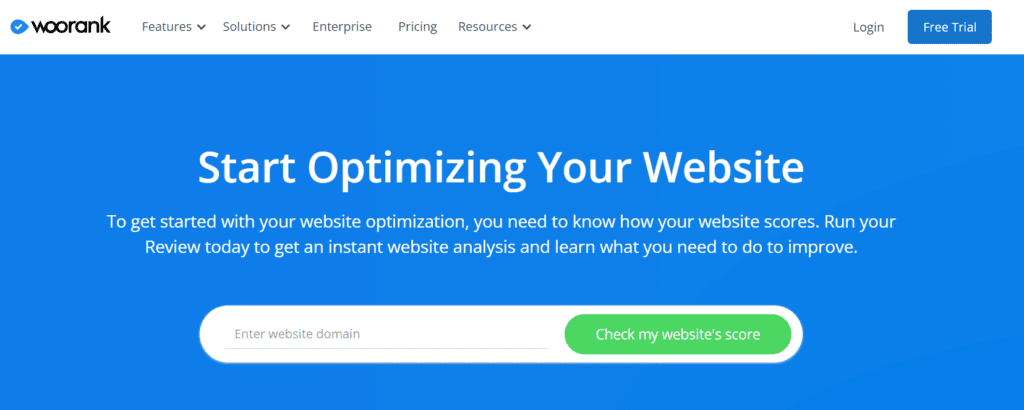
2. Google Analytics
- Google Analytics is a powerful web analytics tool offered by Google that provides valuable insights into website traffic and user behavior. It allows businesses to track various metrics such as website visits, bounce rates, and conversion rates, enabling them to make data-driven decisions to improve their online presence.
Uses:- Track website traffic and user behavior to understand audience demographics and interests.
- Measure the effectiveness of marketing campaigns and website content.
- Identify areas for improvement to enhance user experience and increase conversions
3. Moz
- Moz is a leading SEO software provider offering a suite of tools to help businesses improve their search engine rankings and online visibility. From keyword research to backlink analysis, Moz provides comprehensive solutions to address various aspects of SEO strategy.
Uses:- Conduct keyword research to identify high-potential keywords for content optimization.
- Analyze backlinks to assess website authority and identify link-building opportunities.
- Monitor website performance and track keyword rankings to measure SEO progress over time.

4. BuzzSumo
- BuzzSumo is a content marketing tool that helps businesses discover trending topics and analyze content performance across various platforms. By providing insights into social media engagement and content shares, BuzzSumo enables marketers to create highly engaging content that resonates with their target audience.
Uses:- Discover trending topics and popular content in your industry to inform content creation strategies.
- Analyze social media engagement metrics to understand audience preferences and behavior.
- Identify and collaborate with key influencers to amplify your content reach and engagement.
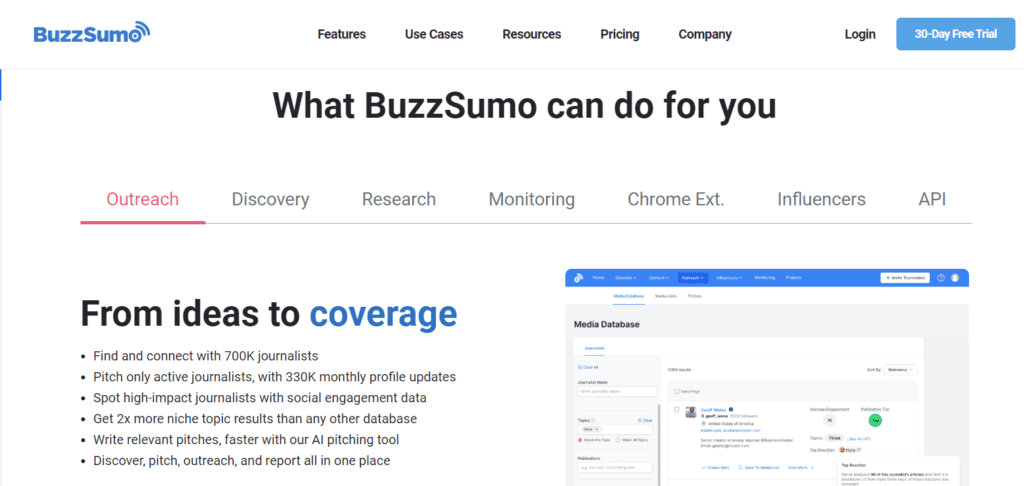
5. Ubersuggest
- Ubersuggest is a free SEO tool that offers keyword research, competitor analysis, and site audit features. It provides valuable insights into keyword metrics, backlink data, and site health, helping businesses improve their search engine rankings and online visibility.
Uses:- Conduct keyword research to discover new keyword opportunities and assess keyword difficulty.
- Analyze competitor websites to identify their top-performing keywords, backlink sources, and content strategies.
- Audit your website for SEO issues such as broken links, missing meta tags, and duplicate content, and receive actionable recommendations for improvement.
6. Schema.org
Schema.org provides a structured data markup vocabulary that webmasters can use to enhance the presentation of their web pages in search engine results. By implementing schema markup, websites can provide search engines with additional context about their content, leading to richer and more informative search listings.
Uses:
- Enhance search engine visibility by providing structured data markup that helps search engines understand and display website content more effectively.
- Improve click-through rates by enabling rich snippets, such as star ratings and product information, in search engine results.
- Increase website credibility and trustworthiness by displaying relevant information directly in search listings.
7. GTmetrix
- GTmetrix is a free website performance monitoring tool that analyzes web page speed and provides actionable recommendations for optimization. By measuring various performance metrics and identifying bottlenecks, GTmetrix helps website owners improve loading times and user experience.
Uses:- Assess website speed and performance by analyzing key metrics such as page load time, page size, and server response time.
- Identify performance issues and potential optimizations to enhance website speed and loading times.
- Monitor website performance over time and track improvements resulting from optimization efforts.
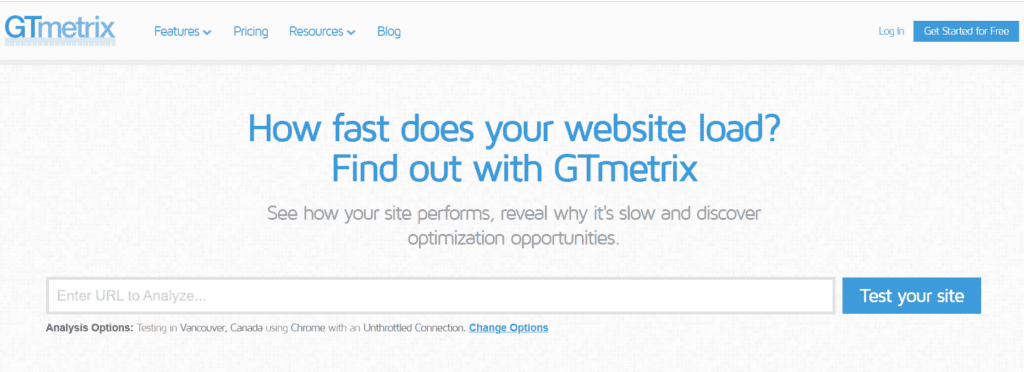
8. Google’s Mobile-Friendly Test
Google’s Mobile-Friendly Test is a tool provided by Google to help website owners determine if their web pages are optimized for mobile devices. With the increasing prevalence of mobile browsing, ensuring mobile compatibility is essential for maintaining search visibility and providing a seamless user experience.
Uses:
- Check the mobile-friendliness of web pages to ensure they render properly on mobile devices and tablets.
- Identify mobile usability issues such as small font sizes, touch elements too close together, or incompatible plugins.
- Optimize web pages for mobile devices to improve user experience and maintain search engine rankings.
9. Screaming Frog
- Screaming Frog is a website crawling tool that allows users to analyze website structure, identify technical issues, and audit on-page elements. With its comprehensive set of features, Screaming Frog helps SEO professionals uncover optimization opportunities and improve website performance.
Uses:- Conduct website audits to identify technical issues such as broken links, duplicate content, and missing meta tags.
- Analyze on-page elements including titles, meta descriptions, and headings to ensure they are optimized for search engines.
- Discover internal linking opportunities and ensure a logical website structure to enhance crawlability and indexing.
10. Google Search Console
- Google Search Console is a free web service provided by Google that allows webmasters to monitor, maintain, and troubleshoot their website’s presence in Google Search results. It provides valuable insights into how Google views and interacts with a website, helping site owners optimize their online presence.
Uses:- Monitor website performance in Google Search results, including impressions, clicks, and click-through rates for specific queries and pages.
- Identify and fix technical issues such as crawl errors, mobile usability problems, and security issues that may affect search engine visibility.
- Submit sitemaps to Google for indexing and receive notifications about indexing issues, manual penalties, and other important updates.
- Utilize the URL Inspection tool to troubleshoot indexing issues, view how Googlebot crawls and renders pages, and request reindexing for updated content.
- Access valuable data about website traffic, search queries, and user behavior to inform SEO strategies and improve overall search engine performance.
Google Search Console is an essential tool for website owners looking to optimize their presence in Google Search and enhance their overall SEO efforts.
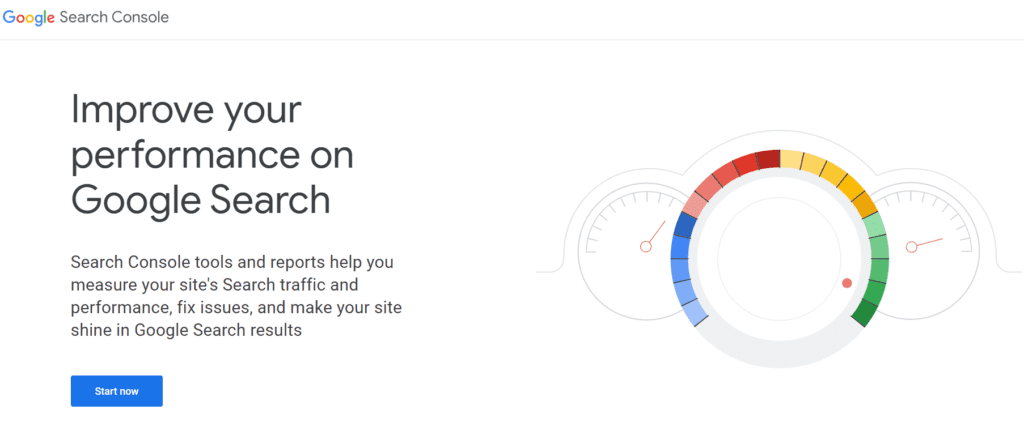
11. Quick Click Website Audit
- Quick Click Website Audit is a free tool that provides a rapid analysis of a website’s SEO health. It quickly identifies common SEO issues and offers recommendations for improvement, making it a valuable tool for website owners looking to optimize their online presence.
Uses:- Conduct a quick assessment of a website’s SEO health, including on-page elements, technical issues, and performance metrics.
- Identify common SEO issues such as broken links, missing meta tags, duplicate content, and page speed problems.
- Receive actionable recommendations for improving website performance and search engine visibility.
- Prioritize and address critical SEO issues that may be impacting website rankings and user experience.
- Generate reports to track progress over time and measure the effectiveness of SEO efforts.
12. Data Studio
- Data Studio is a free data visualization tool offered by Google that allows users to create custom reports and dashboards using data from multiple sources. It enables SEO professionals to visualize and analyze key metrics related to website performance and user behavior, helping them make data-driven decisions.
Uses:- Create custom reports and dashboards using data from Google Analytics, Google Search Console, and other sources to monitor website performance.
- Visualize key SEO metrics such as organic traffic, keyword rankings, conversion rates, and user engagement to identify trends and patterns.
- Customize reports with interactive charts, graphs, and tables to communicate insights effectively to stakeholders.
- Share reports with clients, team members, or stakeholders to collaborate on SEO strategies and track progress towards goals.
- Integrate with other Google products and third-party data sources to gather comprehensive insights into website performance.
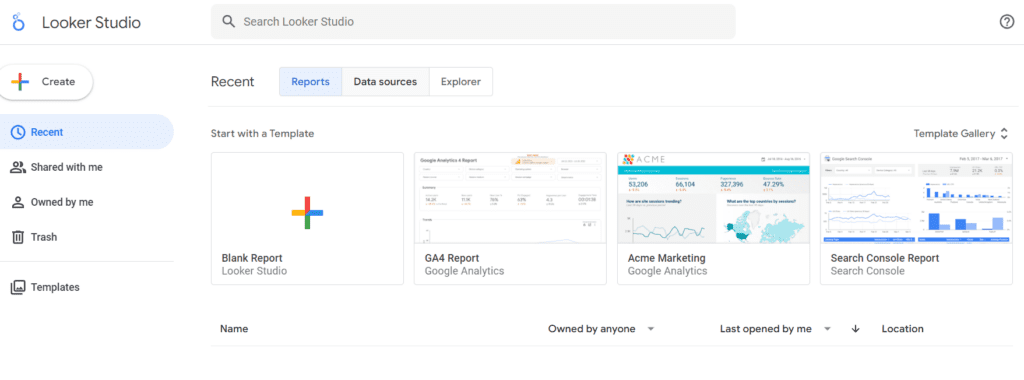
13. Robots.txt Generator
- The Robots.txt Generator is a free tool that helps webmasters create and customize the robots.txt file for their website. This file instructs search engine crawlers on which pages to crawl and index, improving control over how a website appears in search engine results.
Uses:- Generate a robots.txt file tailored to specific directives and instructions for search engine crawlers.
- Control crawler access to different areas of a website, such as blocking sensitive or duplicate content from being indexed.
- Exclude specific pages or directories from being crawled and indexed by search engines to prevent them from appearing in search results.
- Ensure proper indexing of important pages and resources while preventing search engines from accessing irrelevant or low-quality content.
- Test and validate the robots.txt file to ensure it is correctly configured and adheres to best practices for search engine optimization.
14. Google Ads Keyword Planner
- Google Ads Keyword Planner is a free keyword research tool offered by Google as part of its advertising platform. While primarily designed for planning Google Ads campaigns, it is also a valuable resource for SEO professionals looking to discover new keywords, assess search volumes, and analyze keyword trends.
Uses:- Discover new keyword ideas based on seed keywords, website URLs, or product categories to expand keyword targeting and optimize content.
- Evaluate keyword search volumes, competition levels, and cost-per-click (CPC) estimates to prioritize keywords for SEO efforts.
- Identify long-tail keywords and niche opportunities that may have lower competition and higher relevance to target audiences.
- Analyze keyword trends over time to understand fluctuations in search demand and adjust SEO strategies accordingly.
- Generate keyword forecasts and performance estimates to inform budgeting and resource allocation for SEO campaigns.
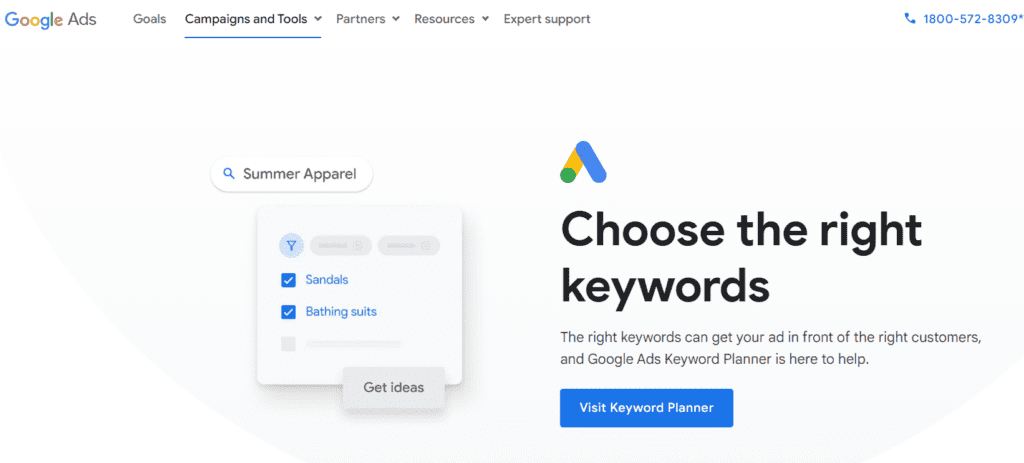
15. Yoast SEO
- Yoast SEO is a popular WordPress plugin that helps optimize websites for search engines and improve their rankings in organic search results. It offers a range of features and tools to assist with on-page SEO, content optimization, and technical improvements, making it a valuable asset for WordPress users.
Uses:- Optimize on-page elements such as meta titles, meta descriptions, and URL structures to improve search engine visibility and click-through rates.
- Assess content readability and keyword usage to ensure that content is well-optimized for both search engines and users.
- Generate XML sitemaps and manage breadcrumb navigation to enhance website crawlability and indexability.
- Implement canonical tags, noindex directives, and other technical optimizations to prevent duplicate content issues and improve site architecture.
- Receive real-time feedback and recommendations for improving SEO while creating or editing content within the WordPress editor.
By leveraging these top 15 free SEO tools in 2024, you can optimize your website, improve your search engine rankings, and drive more organic traffic to your site. Whether you’re conducting keyword research, analyzing competitor strategies, or optimizing your website’s performance, these tools provide valuable insights and actionable recommendations to help you succeed in the competitive world of SEO.




